July 2023: Olive Tree

Volume VIII/Issue 4/July 2023


From The Editorial Desk
On Conclave
The world that we live in now is ego centric. What seems to matter most is pleasure. What is good for the self. What is good for the body. It is no longer surprising if submission and obedience are not popular now a days. Thus, it is one of the reasons sedevacantism is popular among traditionalist. Nobody wants to obey a living and breathing Pope. They are stuck in following the precepts of the past. But remaining sedevacantism is tantamount to unwillingness to die to self. With sedevacantism , lawlessness become the rule of thumb. " you want it, then, do it. " However, freedom does not mean anarchy.
When July 1990 conclave was held in Delia, Kansas, many personalities were invited to participate. But, only six people manifested their interest. Then, when election of Pope Michael was over, many bashed and criticized him. This was not a surprise since nobody else wants to obey an authority. Everybody wants to be " the boss". Everyone wants independence from authority especially the Supreme Pontiff. Nonetheless, the conclavist six that July 1990 has chosen the road less traveled.
Thirty three years have passed, but the lesson must not be forgotten : sedevacantism is not good enough. Hence, this forthcoming July 25, 2023 we shall choose the successor to Pope Michael of happy memory. The electors will be those who are in communion with Pope Michael. Other sedevacantists are no longer invited in as much as they were invited before yet they snubbed the invitation.
We are inviting all of you to pray that we may have a Pope. A Pope after the heart of Our Lord Jesus Christ, the Pastor Bonus. Pray to the Holy Spirit that whoever may be elected among the clergy may sanctify, teach and govern after the image of Apostle Peter not Emperor Constantine.
Service is an offshoot of Charity. It's a virtue. But Authority is necessary. The Lord Jesus Christ said, " ...teach them to observe all things whatsoever i have commanded you " ( Matthew 28:20 ). We need a successor to the chair of Peter. In as much as he will be the visible sign of unity.

So How Should We Think About "Pride Month"?

How did we get to a place where families freely choose to take their children downtown to watch parades of sexual perversion? Or to libraries to watch scantily dressed men prance around in women's clothes and makeup?
Do we think that God is not watching what we are doing to our children?
Jesus spoke in Matthew 12:43-45 about the fate of a man who had been freed from demons but did not fill his spirit with the spirit of God and ultimately receives seven worse demons than originally.
This risk also applies to societies.
When we took the Bible out of our schools it left a vacancy that has been filled by numerous demons. Families also set themselves up to harvest bad fruit when they substituted television for the family rosary and family devotion. These two trends have unleashed one of the most brutal demons, the one behind transgenderism.
The Christian Post reports that,
“…the number of young people identifying as transgender has doubled in just the last few years.”
What was originally a very rare case of what science calls “gender dysphoria,” has now tripled from 2017 to 2021 of minors in America receiving that diagnosis. More than forty-two thousand received the diagnosis in 2021 alone.
Before social media, parents were careful to guard the environment around their children because they understood the “power of suggestion.” Any curious child introduced to a highly emotionalized subject will immediately scramble to know more about it. Those introductions were kept to a minimum until they reached maturity enough to understand the context.
Now we have what is called “social contagion” that is spreading perverse suggestions that feed the youthful curiosity and it's happening completely unaware to parents because most kids have access to their own internet connected device that's rarely monitored. This social contagion is greatly lubricated by the convenient interaction of social media.
The Christian Post reports:
“On the popular social media platform TikTok, #trans, has logged 50.2 billion views as of this writing, having nearly doubled within the last year.”
And Satan has engineered the entertainment industry to idolize the most physically attractive, feeding the “dysphoria.” These statistics indicate that our young ladies are the most vulnerable to this satanic attack.
US transgender clinics report that about two-thirds of their patients are female.
An astounding second chapter to this story is that some of the supposedly caring, healing, professionals in the medical field are now cooperating and destroying the lives of these young women. They are quick to prescribe puberty blockers that cause sterilization, and permanently altering healthy young bodies with grotesque surgeries.
Fortunately, some victims of this diabolical lie are loudly voicing their regret. They are pointing to the 20-times-normal suicide rate of transitioned people and to the 44,000 members of a detransition community labeled "r/detrans", which is a social "community" on the social platform Reddit.
It can be difficult for many of us who have grown up in the church to understand the terrible mental battle some people experience with gender dysphoria. While reviewing some of the content from users on Reddit for this article, the following post from user TAta_72 really puts the struggle into perspective:
"I'm a teen and about 6 months ago, I started to feel uncomfortable about my body and questioned my gender identity. It started off kinda casually like just writing [in] my diary about 'reasons' to be a boy and then it went straight up hating my body (after searching trans-related things). At first, I was confused and decided to identify as non-binary. Later, I identified as a trans boy.
"My 'dysphoria' got worse over time as I 'tried' to be trans by hating my body, the female pronoun, and such. I know that maybe that is because of other reasons (internalized misogyny, being a tomboy, etc.) but still, I still unconsciously convinced myself that I'm trans. Then everything broke me down after I watched a detransitioner video. I then watched more and more content about detrans and trans, fighting over if I'm trans or not, to the point I just gave up, accept that I'm not trans and wrote my story in this reddit to find some advice.
"Now, I feel so much better. Though I haven't felt fully comfortable in my own skin but I'm glad I accept my body, my gender and since then things get so much easier. I'm finally free from this 'trans' stuff."
[Reddit user: TAta_72] (June 7th, 2023)
The inner torment this person has experienced is palpable. Perhaps she is one of the stronger ones who have been able to realize how the dysphoria affected her mental health and to finally be able to accept her God-given gender at birth.
Another aspect of this is told by those who have gone through transition surgery, like Chloe Cole, or others who have taken hormones in preparation for surgery, like Christopher Beck. They are bravely making the news circuits eloquently describing the horrors of the transitioning procedures and hormones that caused permanent damage to their bodies. They tearfully regret that they may never be able to have children or nurse them if they had.
• • • • • •
 (LEFT): Chloe Cole is an American activist who opposes gender-affirming care for minors and supports bans on such care following her own detransition. (RIGHT): Christopher Beck is a retired United States Navy SEAL who gained public attention in 2013 after coming out as a trans woman, and in 2022, when he announced his detransition.
(LEFT): Chloe Cole is an American activist who opposes gender-affirming care for minors and supports bans on such care following her own detransition. (RIGHT): Christopher Beck is a retired United States Navy SEAL who gained public attention in 2013 after coming out as a trans woman, and in 2022, when he announced his detransition.
• • • • • •
Backing them up are brave parents nationwide that are standing against local school boards for grooming the kids for transition and keeping it from the parents. They are also exposing libraries that carry pornography and lawmakers who are permitting rapists into women's bathrooms and prisons.
In the Great Commission, Jesus said to go and preach the truth. We are at the point where you risk arrest if you do. But we have no choice if there is any chance of saving humanity and equipping people to stand against the devil's evils.

Mary The Magnifier
A magnifying glass, binoculars, or telescope zooms in on an object so it becomes larger in our eyes. The result is that we see that object more closely and value it more highly.
How did Mary make the Lord large? Not with a magnifying glass, but with her words. Luke tells us what she said (Luke 1:46-55). He also tells us where her words came from, from in her spirit. “Her spirit rejoiced in God her Savior” (Luke 1:47).
Mary, the mother of Jesus, was a magnifier. When she realized that God had chosen her to give birth to the Messiah, she magnified the Lord.
How do we know she did this? She said, “My soul doth magnify the Lord. ” (Luke 1:46). Most of us are familiar with the Latin version of this song called the Magnificat. This Latin title means “enlarge” and here it refers to Mary’s desire to enlarge the Lord. The Greek word means “to make large” or “to honor highly.”
Why did she do this? Why did she go public with her private feelings?
For two reasons:
-
First, she zoomed in on what God had done for her as an individual. “Because he hath regarded the humility of his handmaid ” (Luke 1:48) and “Because he that is mighty, hath done great things to me ” (Luke 1:49). She magnified the Lord because he had focused on her and done great things to her. This fact overwhelmed her.
-
Second, she zoomed in even further on what God had done for her nation and the world. Notice how she expands both of her reasons for magnifying the Lord with “all generations” (Luke 1:48) and “from generation to generation” (Luke 1:50). She magnified the big-picture, long-term results of God’s blessing in her personal life.
We’ve mentioned that magnify means “to make large,” but what does rejoice mean here? It’s not the general, regular word for joy or happiness but is a special word that means “to be extremely glad or overjoyed.” It refers to a kind of joy that springs up inside when you understand and embrace spiritual truth from God.
“To rejoice” here portrays the strong form of joy and elation you feel when you have a “light bulb moment” about something pertaining to God. It’s not understanding something in an intellectual way like “now that makes sense,” but understanding the greater spiritual significance as well, seeing the truth from God’s perspective.
Mary magnified the Lord as her master.
She said, “My soul magnifies the Lord” (Luke 1:46). While this title carries over profound significance from the Old Testament (OT) by its connection to God’s personal name, Yahweh, Mary seems to have a more specific idea in view here.
Mary’s song follows a similar pattern to OT psalms and poetry which we call Hebrew parallelism. This pattern often pairs two lines together as a couplet to express a complete idea, then it strings these couplets together one after another to paint a larger idea.
In the first line, Mary calls God “the Lord” (Luke 1:46), then in the first line of the next couplet she calls herself “his handmade” (Luke 1:47). The word Lord here means “master” and the word handmade refers to a female slave.
Mary considered herself to be a committed servant of God. This was her mindset from the moment the angel explained God’s plan to her. Once she learned that she would be the mother of the Messiah, she said, “Behold the handmade/servant of the Lord! Let it be to me according to your word” (Luke 1:38).
Do you view God as your master?
Though we recoil today at the thought of being a slave, we should make at least one exception in our minds. We should never recoil at the thought of being God’s slave. As our master, he never treats us with cruelty or contempt. As Mary will say later in her song, he is a master who “does great things” for his servants, “shows mercy” to his servants, “exalts the lowly,” and “fills the hungry with food.”
To live as a servant of God does not mean that you’ll live a comfortable or easy life. Mary, for instance, faced many hardships.
-
She was betrothed to a carpenter who she would never be married to nor have children by him.
-
She was more then likely widowed at an early time in her life (Mark 6:3).
-
She carried the reputation of an immoral woman since people who didn’t comprehend the virgin birth wrongly believed that she and Joseph had improper relations before they were married (John 8:41).
-
She watched the brutal execution of her son as a heinous criminal (John 19:26-27).
Did she know she would endure all these things? Not all of it and not right away, but neither did any of this suffering erase her exemplary position.
I like how the Apache Indian language translates this as: “‘I the-one-who-works-for-him who-am-not-great’” When we comprehend the greatness of God, we will understand his right to be our master and we will submit ourselves to do whatever he wants us to do.
Our greatest honor and meaning in life comes not from material and social advancement but from understanding our place in God’s plan for bringing Christ to the world and then participating in that plan wholeheartedly.
Are you doing what God expects you to do to bring his salvation to the world? If so, what have you suffered for doing so?
Mary magnified God as her Savior.
Mary not only magnified God as her master, but she magnified him as her Savior. In what way did she experience the salvation of God? She said it was “because he has regarded [her] lowly estate” (Luke 1:48).
To “look upon” means to more than to see or notice something. It means to look closely at something and pay careful, focused attention to it. That’s what Mary said God had done for her, he had not only noticed her situation, but he intervened.
Here Mary refers to her “lowly estate” (Luke 1:48). We can’t be sure what this means because she doesn’t explain her misfortune in detail, but it does refer to some kind of unfortunate position in life. Perhaps it refers to how the Roman Empire was ruling over her nation, Israel, or perhaps it refers to her place in a lower-class layer of society.
Whatever the case, God had noticed her life on the fringe and in the shadows of this world and he took action to rescue her for something greater. As the angel had said, she would give birth to a son who would be acknowledged not only as king over the nation of Israel but as High King over all – “the Son of the Highest” (Luke 1:32-33).
Mary was not the first to call God her Savior. Throughout the OT, the word “Savior” describes God about 35 times and people only only about five times (e.g., Psa 24:5; 25:5; 95:1; Mic 7:7; Hab 3:18). God did not become the Savior of his people in the New Testament (NT), he has always been the Savior of his people and continues to be so today.
Now, up until this song of Mary Luke hasn’t specifically described Jesus as our Savior from sin and death. He has focused instead on Christ’s role as the Savior of his people as a king who triumphs over ungodly rulers and places his people in a position of authority and blessing beside him. Even here, Mary is referring more to God the Father or God in general than she is to Jesus Christ and she is referring to God as her Savior for giving her the privilege of being Christ’s mother.
I say this to point out how Luke seems to be building up to a more specific focus on Christ’s role as our Savior from sins later in the book. It’s not until the end of a speech by John the Baptist’s father, Zacharias, that we learn how Christ’s salvation will include “remission of sins,” (Luke 1:77) a theme that John the Baptist would continue in his preaching ministry years later (Luke 3:3).
I say all that to say that the salvation Mary focuses on in her song is how God had rescued her from a difficult, low-lying position in the world. Though she trusted in the Lord by faith, she had been overlooked by society and lived what seemed to be an insignificant life. But now her fortunes had changed forever (literally for “all generations,” Luke 1:48).
By a change of fortunes, I don’t mean that she became an immediate success by the world’s standards. As we’ve already noted, her life actually became more difficult instead. Yet because of what God had chosen her to be and do, her life moved from insignificant to significant, meaningless to meaningful.
That’s what God does and not just for Mary. He gives everlasting meaning and purpose to meaningless and purposeless lives. He rescues us from meaningless, purposeless lives that are limited by material and temporal boundaries. Though no one but Mary would become the mother of the Messiah, God continues to place people like us into his plan for bringing the message of that Messiah and God’s coming kingdom to the world.
Let’s glance back at two occasions in the OT when God “looked upon” (same terminology that Mary used here) the misfortune of his people.
God delivered the Hebrew people from slavery.
The descendants of Abraham, to whom God had promised the land of Palestine, were forced into lives of painful, excruciating slavery.
“The Egyptians made the children of Israel serve with rigor [violence]. And they made their lives bitter with hard bondage—in mortar, in brick, and in all manner of service in the field. All their service in which they made them serve was with rigor [violence].”
Exodus 1:13-14
“The children of Israel groaned because of the bondage, and they cried out; and their cry came up to God because of the bondage. So God heard their groaning, and God remembered His covenant with Abraham, with Isaac, and with Jacob. And God looked upon the children of Israel, and God acknowledged them.”
Exodus 2:23-25
“We cried out to the LORD God of our fathers, and the LORD heard our voice and looked on our affliction and our labor and our oppression. So the LORD brought us out of Egypt with a mighty hand and with an outstretched arm, with great terror and with signs and wonders.”
Deuteronomy 26:7
God paid close attention to his people’s misfortune and delivered them so that they could participate in his plan to bring redemption and establish his kingdom in the world (just as he will do on a worldwide scale in the future, per Revelation).
Mary identified with this deliverance using similar language in her song and believed that God choosing her to be the mother of the Messiah was just as astounding.
God delivered Hannah from a barren womb.
Later in Israel’s history, similar language of God having “looked upon” a godly woman named Hannah. Her husband had two wives the other gave birth to children, but Hannah was unable to conceive. So, she prayed to the Lord fervently that he would intervene in her natural condition and give her a child.
“She was in bitterness of soul and prayed to the LORD and wept in anguish. Then she made a vow and said, “O LORD of hosts, if you will indeed look on the affliction of your maidservant and remember me, and not forget your maidservant, but will give your maidservant a male child, then I will give him to the LORD all the days of his life, and no razor shall come upon his head”
1 Samuel 1:11
In answer to Hannah’s prayer, God gave her a son named Samuel who would go on to be his prophet to the nation of Israel whose most significant achievement would be anointing David to be the king of Israel. In answer to this prayer, Hannah responded in a similar way to Mary centuries later.
See if you can notice the similarities. The similarities are so strong that it would be reasonable to conclude that Mary was so familiar with this prayer that she quoted words from it in her own song of praise.
“My heart rejoices in the LORD; My horn is exalted in the LORD. I smile at my enemies because I rejoice in your salvation. No one is holy like the LORD, for there is none besides you, nor is there any rock like our God. Talk no more so very proudly; let no arrogance come from your mouth, for the LORD is the God of knowledge; and by him actions are weighed. The bows of the mighty men are broken, and those who stumbled are girded with strength. Those who were full have hired themselves out for bread, and the hungry have ceased to hunger. Even the barren has borne seven, and she who has many children has become feeble. The LORD kills and makes alive; he brings down to the grave and brings up. The LORD makes poor and makes rich; he brings low and lifts up. He raises the poor from the dust and lifts the beggar from the ash heap, to set them among princes and make them inherit the throne of glory. For the pillars of the earth are the LORD’s, and he has set the world upon them.”
1 Samuel 2:1-8
From what misfortunes has God delivered you?
As we consider how Mary magnified the Lord when he delivered her from misfortune, it is appropriate to examine our own lives. From what misfortunes as God delivered us?
Has God delivered you from physical or social misfortune?
Abandonment. Abuse. Addiction. Confusion. Debt. Depression. Disease. Failure. False accusations. False religion. Fear. Homelessness. Hopelessness. Hunger. Ignorance. Illness. Isolation. Rejection. Poverty. Violence.
Whatever your misfortune may have been, don’t fail to magnify the Lord through your words. Tell people what God has done. Let them know where you came from and what he did to give your life real meaning.
Most importantly, be sure that you are recognizing him as your Lord and embracing your obligation to be his servant. Be like Mary and say, “Yes, Lord, I will do whatever you want me to do no matter what.”

Divine Sense of Humour
The class of people who have the Divine Sense of Humor are saints. I do not mean canonized saints, but rather that great army of great Catholics to whom every incident speaks a story of God's love. A saint can be defined as one who has the Divine Sense of Humor, for a saint never takes this world seriously as the lasting city. A saint is one who looks out upon this world as simply a nursery to the Fathers heavenly mansion and a stepping stone to the Kingdom of Heaven. A saint is one to whom everything in the world is a sacrament. In the strict Catholic sense of the term there are only seven sacraments, however in the broad sense of the term everything in this world is a sacrament, for everything in this world can well be used as a means of sanctification. A saint is one who never complains about his or her state in life for they know that all the world is but a stage and all the people are merely players. For when the curtain goes down on the last day, and we then respond to the curtain call of judgement, we will not then be asked what part we played, but rather how well we played the part that was assigned to each of us. God bless each of you.
‘Sound of Freedom’ overcomes media opposition to a staggering $40 million opening week
Despite relentless, desperate attempts by secular media to prevent the public from seeing Sound of Freedom, the movie has already earned more than $40 million in ticket sales – nearly three times its cost to produce – and is projected to finish out the weekend in third place.
Since its spectacular Fourth of July opening, ticket sales have soared. As of Sunday morning, more than 3.1 million advance tickets have been sold online as the movie-going public is awakening to the depraved multi-billion dollar child sex-trafficking industry, of which the United States is its largest consumer.
“As with our July 4th numbers, today’s numbers exceed our expectations, and we’re going to continue this momentum,” said Brandon Purdie, head of theatrical distribution at Angel Studios.
The movie is based upon the true story of former government agent Tim Ballard who quit his job to rescue a little girl from sex traffickers in the Colombian jungle. In the process, Tim ended up saving 123 people, 55 of whom were children, from one mission alone.
Since then, Ballard and his organization, Operation Underground Railroad, have rescued thousands of children.
“Sound of Freedom has taken on a life of its own. We’re getting messages from all over the country telling us about packed theaters, sold-out theaters, and spontaneous standing ovations for the film in numerous locations,” said Purdie. “Seeing this film has become a must thanks to incredible word-of-mouth.”
In what appears to be a panicked reaction to the film’s success, secular media has done everything in its power to keep the public from seeing it. Both The Guardian and The Washington Post attempted to taint the movie by suggesting a link to the QAnon movement.
CNN likewise aired a QAnon-based review of the movie in a desperate attempt to ward people away from educating themselves concerning the horrific child sex-trafficking industry.
Attempts by mainstream news outlets to undermine the movie have been powerless to overcome the strong grassroots word of mouth recommendations in communities across the nation.
Sound of Freedom enjoys an A+ rating from CinemaScore, and a 76/99 audience rating at Rotten Tomatoes, beating out Indiana Jones and the Dial of Destiny which received just 69/88 score.
“We’re deeply grateful to AMC, Cinemark, Regal, and all our theater partners – and their hard-working theater staff members – for working with us to accommodate the surging demand for this film and having the courage to release Sound of Freedom during the busiest movie season of the year,” noted Angel Studios distribution executive Purdie.
Surrogate mother says homosexuals pressured her to abort late-term baby after cancer diagnosis
A surrogate mother has spoken out about how two homosexual men who paid for the baby she carried demanded that she abort the child and threatened her with a lawsuit after she was diagnosed with breast cancer.
Brittney Pearson, a 37-year-old mother of four in Sacramento, California, recently shared her experience as a surrogate, which ended abruptly when she received a metastatic breast cancer diagnosis, leading her to deliver the child she carried 15 weeks before his due date. The baby’s adoptive “parents” — a pair of homosexual men — reportedly insisted on abortion instead, as they did not want a child who could have medical issues, and demanded that no life-saving treatment be given to him if born alive. They also sought to stop Pearson from giving the boy up for adoption, saying that they did not want their “DNA out there.”
Speaking to Center for Bioethics and Culture (CBC) president Jennifer Lahl, who first publicized the story, Pearson expressed her frustration at feeling like “a rented uterus” when the men disregarded her condition.
Pearson explained that she was diagnosed with cancer in May at roughly 24 weeks’ gestation. Having participated in surrogacy two years earlier with no complications, she first contacted the agency that she worked with to ask “how I was supposed to handle” the situation.
“I made it very clear to my OB [obstetrician], my oncology team, and the agency that my main focus was making sure that I could continue the pregnancy and that the baby would be OK, which the oncology team confirmed at that time the cancer that I had was totally fine for me to continue,” Pearson said.
But other tests found that the cancer was more serious, requiring two treatments that would harm the developing baby if taken during pregnancy. However, doctors “were still confident that I would be OK waiting to start those other two and do just the first two for now, to get me through the rest of the pregnancy.”
Upon learning of her diagnosis, Pearson said that the two men “kind of freaked out a little bit” and suddenly became “a little more intrusive” than she desired.
Pearson said that she wanted to get updates by herself and share the information with the men rather than having them present at her doctor’s appointments. However, “they weren’t happy with that” and began “reaching out to everybody … and threatening lawsuits.” When legal fights hung in the balance, Pearson’s oncology doctors put her treatment on hold to verify with lawyers their rights to continue tending to her illness regardless of the men’s demand that she receive no treatment while pregnant.
“They threatened my OB, they threatened my oncology team, so then my oncology team was like, ‘Well, we need to get our lawyers involved, because we don’t know if we can give you chemo without their permission,’” she said.
“I felt like just a rented uterus. I felt like they only cared about their baby [and] I obviously cared because I didn’t want anything to happen to the baby either, but they didn’t care about me at all,” she added. “They would say it to me, they would text me [and say], we’re here for you, whatever you need, but then to all my doctors they’d be completely different.”
When an MRI showed that the cancer had metastasized and chemotherapy would no longer be an effective treatment, doctors suggested “termination” or “just having the baby” early so that Pearson could continue treatment without hurting the child in her womb.
However, the men were adamantly against the baby being born before 38 weeks, falsely claiming that a child born even at 34 weeks would be “blind and deaf” and may not survive.
Despite “multiple families” willing to adopt the child instead, the men “refus[ed] any type of medical intervention,” demanding that the baby be aborted rather than being raised by other people.
“They just wanted their baby’s remains and to move on with life,” Pearson said.
When asked about the delivery, she refrained from sharing details beyond that she gave birth at 25 weeks, that “the baby is not alive, and the parents should have [the] remains by now.”
Details on whether the baby was born alive and received treatment at the hospital have not been confirmed by Pearson. The identities of the men have also not been disclosed.
“I did surrogacy, you know, to give people a baby and try to help in ways that not everybody could, and they took the whole experience and just completely ruined it,” Pearson said. “In their head, they owned me and my body and that’s not what surrogacy is supposed to be.”
According to Pearson, the contract that she had with the two men stated that “while he [the baby] is still inside of me, I had full control [and] as soon as he’s born, I have no control.” Such language left her with the authority to choose her treatment, which eventually led to premature delivery. Treatment for the child after birth was left up to the men, who presumably did not ensure that there was any in place, although no details about what happened prior to the infant’s death have been confirmed.
She also clarified that since the baby died, monthly payments being sent to her in line with the contract had stopped and that she has not been in contact with the men. Despite the tragic loss of the baby and coming down with cancer — a diagnosis that Lahl speculated may be connected to fertility drugs that the mother was taking — Pearson still defended surrogacy as “a great tool.”
She told the Daily Mail that the men had cremated the baby’s remains, a decision she disagreed with and “didn’t understand since they didn’t see him as a baby at all.”
‘Surrogacy is wrong’
Upon hearing about Pearson’s experience from a friend who happened to be related to the mother, Lahl wrote an article for the CBC in which she described the case as an example of “how surrogacy is wrong, is harmful and is bad for women and for children.”
After describing the situation, Lahl explained that Pearson’s family contacted Child Protective Services (CPS) and local law enforcement for verification that the hospital would be required to care for the baby if he was born prematurely. However, police informed them that “this was up to the hospital, and they knew of no law that would allow them to intervene” as a case of infanticide.
“This case highlights many of the problems with contracted, largely commercial, pregnancy,” Lahl wrote. “The mother wanted to try and deliver early, in hopes of saving the baby, and being allowed to start her cancer treatment in hopes of saving her life. But California law recognizes the contracting intended parents in surrogacy arrangements as the legal parents [and] they alone can make decisions around the care of the baby. In this case, refusing care.”
“These real stories are never splashed on the cover of magazines or make headline news,” Lahl continued. “They don’t support the narrative of Big Fertility, which is to be an angel and help people build a family and get a cute healthy baby they so desperately want. These stories highlight there are real losers that pay a huge price, even if it is their own life.”
Baby girl abandoned in Florida safe haven box adopted by firefighter who rescued her
WEST OCALA, Florida (LifeSiteNews) — The first baby to be saved by a Florida safe haven box has now been adopted by the firefighter who found her.
Baby girl Zoey, who was rescued from a Safe Haven baby box in West Ocala, Florida in January, has now been officially adopted by the firefighter who saved her, after he and his wife tried to have a baby for nearly a decade.
“I picked her up and held her. We locked eyes, and that was it. I’ve loved her ever since that moment,” eight-year firefighter Vincent, who asked that his last name be withheld for privacy reasons, told Good Morning America last week.
Vincent was on duty at the fire station when the little girl was dropped off during the early hours of January 2.
“Dispatch called the station stating that the baby box had been activated. I got out of bed, walked over with another firefighter to go check it to see if there was anything in there and when the lights came on and I opened up the back door to the box, Zoey was laying in there,” he recalled.
As a trained paramedic, Vincent immediately started a medical examination on Zoey and called for hospital transport. He then rode in the ambulance with her to a local hospital for a mandatory observation period.
“I handed the baby off to the nurses so they can do all the stuff they do at the hospital and I pulled the doctor aside and I had asked him like, ‘When’s the caseworker gonna get here? Because I would like to adopt her,'” Vincent explained.
Vincent was not able to speak to the caseworker but, at the suggestion of the doctor, he left a note explaining that he and his wife were certified to adopt in Florida. He also revealed that he and his wife, Katy, had been trying unsuccessfully to have children for nearly a decade.
“I didn’t know whether or not the doctor was going to hand my note all the way to the case manager,” Vincent said. “I honestly just really thought that that was gonna be it and we weren’t gonna be able to see her again.”
However, the couple were allowed to welcome the baby girl into their home within a couple of days. Zoey was officially adopted into the family in April.
“It’s just been a whirlwind. There’s just really no way to describe it. It’s been crazy. Every day, me and my wife still look at each other and just go like, ‘I can’t believe we have a child and I can’t believe our Zoey’s our child and how everything happened,'” Vincent said.
Campaign Life Coalition’s Jack Fonseca celebrated the story, telling LifeSiteNews, “This touching story is another testament that life is winning in America!”
“A mother chose life for her baby instead of abortion,” he declared. “But not only that, she helped a childless couple fulfill their dreams of becoming parents. I can identify with the firefighter because my wife and I suffered nine years of repeat miscarriages, infertility and heart-rending childlessness until we were finally able to adopt.”
“I know how painful it is to watch all your friends have children, go to their birthday parties, and all the while, your home feels empty and you’re praying for nothing more than a baby of your own,” he revealed.
“That birth mother answered the couple’s prayers, and I hope she gets to see that firefighter’s story because it’ll affirm for her forever that she did the right thing in choosing life,” he added.
In his interview, Vincent publicly thanked Zoey’s mother for choosing life for her daughter.
“It’s not about me. It’s not about my wife. It’s not about our journey to have kids. It’s not about me being a first responder. It’s about this beautiful little girl who was given the chance of life, and that she’s been adopted, she’s loved and hopefully her birth mother sees it and recognizes that she did the right thing,” Vincent said. “She doesn’t have to worry anymore. Her daughter’s taken care of and is loved beyond words.”
“We’re just so thankful that … she chose to give Zoey a life and that she chose right, for whatever reason, putting her in that box, and that she gave us a family,” he added.
Zoey was the first baby to be placed in the Safe Haven Baby Box since it was installed at the MLK First Responder Campus in West Ocala.
The Safe Haven Baby Box was founded by pro-life activist Monica Kelsey after learning she had been conceived in rape yet her mother chose life.
The boxes are designed for mothers to securely and anonymously deliver babies to a safe place where they will be taken by professionals for care and placement with a willing family. They are equipped with heating, cooling, and a silent alarm for medical attention.
While the exact details vary, each state has a safe haven law under which mothers who have decided they are unwilling or unable to raise their babies can leave them at certain locations, such as fire stations, hospitals, or police stations, without fear of legal punishment. The option undercuts some of the most commonly invoked rationalizations for abortion: the difficulty, expense, and career or educational impact of raising a child.
Fonseca advocated for more safe haven baby boxes to be set up throughout America and especially in Canada, where he revealed “only four such Safe Haven locations exist, with three in Alberta and one in B.C.”
“More are needed in Canada, especially because we’re witnessing an alarming increase in the number of infanticide cases, with newborns being dumped in recycling bins, in garbage dumpsters, and parking lots,” he added.
“Perhaps the knowledge of a Safe Haven baby surrender locations might’ve prevented these tragedies?” Fonseca questioned.
“This is the kind of adoption story that the pro-life movement needs to tell nationwide,” he declared. “I’m convinced that if more young women in crisis pregnancy possess the awareness that they have the power to become an answer to another couple’s prayers, that many more will consider adoption instead of abortion.”
Marjorie Monaghan, wife of Domino’s founder and Catholic philanthropist Tom Monaghan, has died
(LifeSiteNews) – Marjorie Monaghan, the wife of Catholic philanthropist and Domino’s Pizza founder Thomas Monaghan, has died.
Ave Maria School of Law, which Thomas Monaghan founded, announced that Marjorie “passed away peacefully in her home on Monday, July 3 surrounded by her family.”
Mrs. Monaghan and her husband were married for over 60 years and have four daughters, ten grandchildren, and six great-grandchildren.
Serving the Lord through Catholic philanthropy
Thomas Monaghan, who grew up in a Catholic orphanage after his father died when he was just four years old, founded Domino’s Pizza in 1960. Shortly after, he met Marjorie while delivering pizza, and the two were married in 1962.
Monaghan turned Domino’s into the most successful pizza chain in the world. In 1998, he sold his majority stake in the company for almost one billion dollars to focus on what he wanted to do most: serving the Lord through his Catholic philanthropy.
Monaghan said that “there’s a lot of philanthropy out there, a lot of people giving money to social causes like fighting poverty, or to medical research. These are all very good things, but I don’t think they’re as important as helping people get to heaven.”
“All of the problems that we hear about – the school system, teen pregnancy, crime, drugs, and on and on – when people talk about these things they usually blame them on the breakdown in the family. But they never go to the next step and ask why the breakdown in family. It has to be because of the lack of religion.”
“My overall goal in giving is to save as many souls for the buck as I can. To me that’s why we’re here. That’s why we were created: to be with God forever in heaven,” the Catholic billionaire stated.
The Domino’s founder was aware of the responsibility to use his wealth for the kingdom of God. “I believe all of history is just one big battle between good and evil. I don’t want to be on the sidelines,” he once said.
Monaghan gave away hundreds of millions of his fortune to build up Catholic education. He was very critical of the increasingly liberal and unorthodox Catholic universities in America.
“At some Catholic universities students graduate with their religious faith more shaky than when they arrive,” the philanthropist said.
To help reverse that trend, he founded numerous authentically Catholic schools and universities, including Ave Maria School of Law and Ave Maria University. He also built an entire town around Ave Maria University in Collier County, Florida, with a large church at the center, that now has over 6,000 inhabitants.
Fighters for pro-life and pro-family causes
Next to Catholic education, Monaghan also invested in many pro-life and pro-family projects. One of the reasons why he funded Catholic education, including legal education for Catholics to become lawyers, was to score wins in the fight for unborn life.
“Our aim is to overthrow Roe v. Wade, to bring prayer and religion back into the school system, where it was until just a few decades ago, and to return our nation back to the principles upon which it was founded,” he said in the 1990s.
He is well-known for his pro-life, pro-family commitment, including being very outspoken against contraception.
His Ave Maria Mutual Funds is an investment fund that lets people invest in pro-family and pro-life companies by not including any corporations that are “engaged in abortion, pornography, embryonic stem cell research, or those that make corporate contributions to Planned Parenthood.”
While Thomas Monaghan was in the spotlight most of the time and the leader of the Catholic philanthropic work, he could certainly always count on the support of his wife Marjorie.
The Funny Pharmacy
A joyful mind maketh age flourishing: a sorrowful spirit drieth up the bones. - Proverbs 17:22

Frequently Asked Questions

Can Women Be Ordained As Priest?
The Problem: Some hold that women are capable of being ordained. While Scripture shows women were prophets, sources of wisdom, and sources of salvation for both the Israelites and all of mankind, no passage in Scripture shows women offering sacrifice. A priest's primary duty is to offer sacrifice.
The Truth: No woman can be consecrated into the sacrament of Holy Orders.
Genesis 1:27 And God created man to his own image: to the image of God he created him: male and female he created them.
Galatians 3:28 There is neither Jew nor Greek: there is neither bond nor free: there is neither male nor female. For you are all one in Christ Jesus.
These two verses are sometimes taken in combination to support the idea that Christ did not intend a male-only priesthood. Since there is no male or female in Christ, and both man and woman are created in the image and likeness of God, women must be capable of being ordained. Unfortunately for this line of reasoning, Galatians is not here speaking of holy orders, but of baptismal salvation, as parallel passages make clear:
1 Corinthians 12:13 For in one Spirit were we all baptized into one body, whether Jews or Gentiles, whether bond or free; and in one Spirit we have all been made to drink.
Romans 10:12-13 For there is no distinction of the Jew and the Greek: for the same is Lord over all, rich unto all that call upon him. For whosoever shall call upon the name of the Lord, shall be saved.
Colossians 3:11 Where there is neither Gentile nor Jew, circumcision nor uncircumcision, Barbarian nor Scythian, bond nor free. But Christ is all, and in all.
The Romans, the Galatians, the Corinthians and the Colossians were each denying that certain members of their community could be saved. Paul intended to remind each audience that Christ's salvation was open to all - no one could lose the right to salvation simply because of social status. Since one's salvation is not dependent on being ordained a priest, Galatians does not apply to the problem of Holy Orders.
Romans 16:1-2 And I commend to you Phebe, our sister, who is in the ministry of the church, that is in Cenchrae: That you receive her in the Lord as becometh saints; and that you assist her in whatsoever business she shall have need of you. For she also hath assisted many, and myself also.
This verse says quite a bit less than it appears to. The earliest Christians agree that women who served the Church in various capacities were given the name "deacons" (the translation here is actually faulty - the word "deaconess" doesn't appear until the second century). However, the earliest Christians also agree that female deacons never had the same functions, duties, or sacramental charism as even a male deacon, much less a priest. In fact, one of their primary function seems to have been guardians of the Church doors - that is, deaconesses were essentially doorkeepers.
Even the strongest proponents of women's ordination agree that no orthodox Christian knew of anyone except heretics who attempted to ordain women. In fact, only three heretical sects ever attempted it: the Montanists, the Marcionites, and the Collyridians. The first two Gnostic sects ordained women because both taught that women had to "become like men" in order to be saved (the Gnostic Gospel of Thomas and Gospel of Mary Magdalene both agreed on this point). The third sect worshipped the Blessed Virgin Mary as a goddess - they ordained women because they understood that the priest (or, in this case, priestess) should be in the image and likeness of God. Thus, though they heretically considered Mary to be God, they were at least self-consistent in attempting to ordain women.
For answers to more frequently asked questions, click here: https://www.vaticaninexile.com/frequently_asked_questions.php
The Pope Speaks: Pope Benedict XV
On Preaching the Word of God

[L]et Us quote these words of St. Peter Damian: “For the preacher two things are especially necessary: namely that his words should be rich in ghostly wisdom, and that his life should be conspicuous for the luster of its piety. But if a priest is unequal to being both holy in life and rich in learning, holiness of life is, without question, to be preferred to mere learning. For the example of a saintly life is more powerful than eloquence and a studied delivery…. The priest who discharges the office of preaching should cause showers of heavenly wisdom to fall from his lips, and from his life rays of piety to shine out, just as the angel in telling the shepherds of Our Lord’s birth, both shone with great splendor and expressed in words the tidings he had come to announce.” [Epp. Lib. i, Ep. i ad Cinthium Urbis Praef.]
However, to return to St. Paul, if we ask on what subjects he was wont to discourse when he preached, he condenses them all in these words: “For I judged not myself to know anything among you but Jesus Christ and Him crucified.” [I Cor. ii:2] To make men know Jesus Christ better and better, and to make that knowledge have a bearing, moreover, not only on their faith, but on their lives as well, was the object of that apostolic man’s every endeavor. This was the object of every throb of his apostolic heart. Therefore all Christ’s doctrines and commands, even the sterner ones, were so proclaimed by St. Paul that he did not restrict, gloss over or tone down what Christ taught regarding humility, self-denial, chastity, contempt of the world, obedience, forgiveness of enemies, and the like, nor was he afraid to tell his hearers that they had to make a choice between the service of God and the service of Belial, for they could not serve both, that when they leave this world, a dread judgment awaits them; that they cannot bargain with God; they may hope for life everlasting if they keep His entire law, but if they neglect their duty and indulge their passions, they will have nothing to expect but eternal fire. For our “Preacher of truth” never imagined that he should avoid such subjects, because, owing to the corruption of the age, they appeared too stern to his hearers. Therefore it is clear how unworthy of commendation are those preachers who are afraid to touch upon certain points of Christian doctrine lest they should give their hearers offense. Does a physician prescribe useless remedies to his patient, merely because the sick man rejects effective ones? The test of the orator’s power and skill is his success in making his hearers accept the stern truth he is preaching. How did the Apostle unfold the subjects of which he treated? “Not in the persuasive words of human wisdom.” [I Cor. ii:4] It is perfectly plain, Venerable Brethren, how important for everybody it is that they should thoroughly realize this, since we see that not a few of our sacred preachers overlook in their sermons the Sacred Scriptures, the Fathers and Doctors of the Church,” and the arguments based on sacred theology, and for the most part, make their appeals only to reason. Unquestionably that is wrong, for in the supernatural order, merely human resources are of no help whatever. But the objection may be urged: The people have no confidence in the preacher who insists on Divinely revealed truths. Is that true? With non-Catholics, granted. However, when the Greeks sought the Wisdom, forsooth, of this world, the Apostle, nevertheless, preached to them Christ crucified. If we direct our attention, however, to Catholic people, even those men among them who are unfriendly to us, generally keep in their hearts the roots of faith. Their intellects are blinded because their souls are corrupted. Lastly, what end did St. Paul have in his preaching? Not to please men, but Christ. “If I yet pleased men, I should not be the servant of Christ.” [Gal. i: 10] As his heart was on fire with the love of Christ, he sought for nothing save the glory of Christ. O that all are engaged in the ministry of the Word were true lovers of Jesus Christ. Would that all could repeat these words of St. Paul: “For whom Jesus Christ] I have suffered the loss of all things,” [Phil. iii:8] and “To me to live is Christ.” [Phil.i:21] Only those who glow with love themselves know how to set on fire the hearts of others. Wherefore St. Bernard gave a preacher this counsel: “If you are wise, be a reservoir, not a conduit, be full yourself of what you preach and do not think it enough to pour it out for others.” [In Cant. Serm. 18] The Doctor then adds: “Today we have in the Church a profusion of conduits, but how few are the reservoirs!”
We must strive with all our might and main, Venerable Brethren, to prevent such a state of things from occurring in the future. For it is your duty, by rejecting the unfit and by encouraging, training and guiding the fit, to bring it to pass that there should now be no lack of preachers who are men after God’s own heart.
21. Through the intercession, therefore, of the most Holy Virgin, the August Mother of the Incarnate Word Himself, and the Queen of the Apostles, may Jesus Christ the merciful and everlasting Shepherd of souls vouchsafe to look down with favor on His flock, fill the clergy with the apostolic spirit, and grant that there may be many who will strive eagerly “to present themselves approved unto God workmen that needeth not to be ashamed, rightly handling the word of truth.” [II Tim. ii:15]


St. Francis de Sales' Introduction to the Devout Life
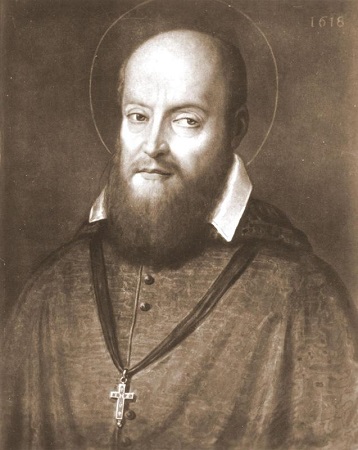
CHAPTER XV
Seventh Meditation - On Hell
Preparation.
1. Place yourself in God’s presence.
2. Humble yourself, and ask His aid.
3. Picture to yourself a dark city, reeking with the flames of sulphur and brimstone, inhabited by citizens who cannot get forth.
Considerations.
1. Even so the lost are plunged in their infernal abyss;—suffering indescribable torture in every sense and every member; and that because having used their members and senses for sin, it is just that through them they should suffer now. Those eyes which delighted in impure vicious sights, now behold devils; the ears which took pleasure in unholy words, now are deafened with yells of despair;—and so on with the other senses.
2. Beyond all these sufferings, there is one greater still, the privation and pain of loss of God’s Glory, which is for ever denied to their vision. If Absalom cared not to be released from exile, if he might not see his father’s face, how much sorer will it be to be deprived for ever of the blessed vision of God?
3. Consider how insupportable the pains of Hell will be by reason of their eternal duration. If the irritating bite of an insect, or the restlessness of fever, makes an ordinary night seem so long and tedious, how terrible will the endless night of eternity be, where nought will be found save despair, blasphemy and fury!
Affections and Resolutions.
1. Read the Prophet’s descriptions of the terrors of the Lord, and ask your soul whether it can face them—whether you can bear to lose your God for ever?
2. Confess that you have repeatedly deserved to do so. Resolve henceforth to act differently, and to rescue yourself from this abyss. Resolve on distinct definite acts by which you may avoid sin, and thereby eternal death.
Conclusion.
1. Give thanks, offer yourself, pray.
Saints from East and West
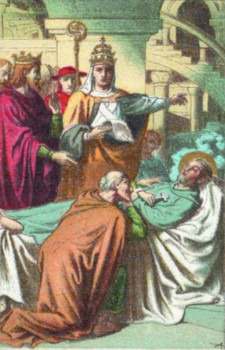
July 17 - Saint Alexius
At Rome, Saint Alexius, confessor, son of the senator Euphemian. Leaving his spouse before the night of marriage, he withdrew from his house, and after a long pilgrimage, returned to Rome where he was for seventeen years harboured in his father's house as an unknown pauper, thus deluding the world in this strange way. After his death, however, becoming known through a voice heard in the churches of the city, and by his own writings, he was, under the sovereign Pontiff Innocent I, translated to the Church of Saint Boniface, where he wrought many miracles.
Saint Alexius was the only son of a rich senator of Rome, Euphemian, and his wife Aglae, born and educated in that capital in the fifth century. From the charitable example of his parents he learned that the riches which are given away to the poor remain with us for ever, and that alms-deeds are a treasure transferred to Heaven, with the interest of an immense reward. Whilst yet a child he was intent on the relief of all whom he saw in distress, and thought himself obliged to those who received his charity and regarded them as his benefactors. Fearing lest the distraction of earthly honours might at length divide or draw his heart too much from more noble objects, he decided to renounce the advantages of his birth and retire from the world.
Having, in compliance with the will of his parents, married a wealthy girl, he on the very day of the wedding parted from her with her consent. In disguise he travelled into Syria, embraced extreme poverty, and resided in a hut adjoining a church dedicated to the Mother of God at Edessa. Here he lived for seventeen years, begging alms at the church doors, which he shared with other poor people, existing himself on what little was left over from their needs, until an image of our Lady spoke and revealed his holiness to the people, calling him "the Man of God." Thereupon he fled back to his home.
His father did not recognize him, but received him as a beggar and gave him employment, allotting a corner under the staircase as his quarters. For another seventeen years he thus lived unknown in his father's house, bearing the ill-treatment at the other servants in patience and silence. After his death a writing was found upon him, giving his name and family and an account of his life.
His fame spread throughout the Catholic world. His history was related and his prayers begged in a canon composed by Saint Joseph the Hymnographer. Special devotion to the saint was held in Rome, and towards the end of the tenth century, the exiled metropolitan of Damascus, Sergius, established at Rome a monastery of Greek monks, residing at the church of Saint Boniface on the Aventine, adding the name of Saint Alexius to the church as co-titular.
As a citizen of Rome the saint had a vast popularity, and this popularity has persisted. In the twelfth century his story is said to have had a deep influence on the heretic Peter Waldo; in the fifteenth, he was chosen as the patron of the nursing congregation commonly called the Alexian Brothers, and in 1817 as a lesser patron of the Congregation of the Sacred Hearts of Jesus and Mary (Picpus Fathers); while in the East he is still greatly venerated as the "Man of God."

Advice You Can Bank On
A Catholic Perspective On Finances
July 2023 - Why We Should Live Simply (continued from June 2023 article)
We Are Disciples
I have kept the most important reason until last-we are disciples. We have a Master whose wishes we seek to honor and follow. when Jesus was here, He left us and outstanding example of simple living. He never traveled to any distant lands or took a vacation. He did not have a motor home-in fact, he didn't even have a home. He probably had only one or two suits of clothing. He owned no land and possessed no material wealth. He went about doing good without compromise, rebuking the rich, exposing the hypocrites, healing the sick, and healing the hungry. He comforted the afflicted and afflicted the comfortable. Not only did Jesus set a personal example to inspire us and guide us, He also gave us many teachings. Primary among those teachings is the danger of material possessions and the importance of trusting God on a daily basis for our food and clothing. We should hold dear the value of trust and contentment that our Lord teaches us-dearer then life itself, and certainly dearer than our comforts and conveniences.
Modern society is a great big melting pot. Everything that goes into that pot gets melted down, stirred together, and mixed up. The contents come out one color and one flavor. Some people like the color and taste of that soup; some don't.
Our Master warned us that the world is on the broad, wide highway. The road that leads to heaven is narrow, and the gate difficult. We have responsibility to ourselves and our children.
My wife does not have a dishwasher. If she had a dishwasher, she wouldn't have to wash dishes by hand. Nor would I have to help her on those evenings when I see that she is tired. Nor would our daughter have to wash dishes, nor would the boys have to help their sister nor their mother.
But that's just the point. We want our daughter to have something to do. We want her to, learn to work even when she is tired of it, to learn to apply herself, to learn to discipline herself, and wash those dishes day after day. We feel that is much better for her character than being idle, or expecting others to do things for her all the time.
If we had all the modern conveniences, It would give my wife more leisure time, so admittedly she would be available to take a job outside the home to help pay the bills. But the Bible says she is to be a "keeper at home." (Titus 2:5). We don't want her going out, or even being available and tempted to do so, not to mention the temptations she would meet in the work place after she went out. Who would care for the children while she was gone? If it came to pass in our home as it has in most American families, the next generation would solve the problem of who looks after the children by using a little foresight and eliminating the children, or a t least reducing the number to a more manageable one or two.
And so we say, "No thanks," to cluttering our lives with as many modern conveniences that we can get. If you don't want to arrive at the same destination others are arriving at,why travel down the road that leads there? Why not stop before you start? Surely by this time, anyone who has observed what has happened to society in America during the last fifty or sixty years has noticed that usually more changes ride on the coattails of the previous innovation. There is no convenient stopping place when you are traveling downhill.
I suppose it is obvious by this time that we are simply not impressed with modern society and the kind of fruit it is bearing. We are grieved and sickened by what we see happening in the lives of many around us- the lack of direction and meaning and the shortsighted pursuit of leisure, pleasure, and comfort. We are dismayed by the number of broken homes and wrecked marriages as families are torn apart by divorce and children grow up without eternal values, in the midst of drugs, violence, immoral living, and despair. Of course, many people don't like these fruits, yet they aren't willing to take actions that are drastic enough to halt the downward slide. They stop short of making the kind of deep and basic changes that are called for.
Be an example yourself first. Become a Disciple of our Master-he loves you and proved it by dying for you. he will break the hold that modern society and all its "good things" has hold on you; He will set you free. He will help you get rid of all the excess in your life and to repent of your selfishness, your irresponsibility toward your neighbors, and your hypocrisy.
I remember climbing a tree as a little boy-an old apple tree in our orchard. There was a hole in the tree, and inside the hole was a bird's nest with four blue eggs. I wanted those eggs and I wanted them badly, but the hole was very small. By pushing and straining, I managed to get my hand in and pick up the eggs. I wanted those eggs and I wanted them badly, but the hole was very small. By pushing and straining, I managed to get my hand in and pick up the eggs, all four of them. But when I drew my hand back, I found that with my fist closed around the eggs, I couldn't get my hand back out of that hole! I tried and tried but it was no use. I had to make a choice that day. I could either stay hanging in that old tree and have my eggs, or I could drop the eggs and be freed. Of course, I eventually decided to leave the eggs there.
That is a dilemma many people are in today. They would like to retain their grasp on the blue eggs this world has to offer, but they would also like to be free. We have a choice to make. Jesus clearly said we can't have both. No man can serve two masters.
Yes, we live simply because we are travelers. We live simply because we are responsible neighbors. But most of all, we will simply because we are disciples of a Master who points us upward, teaching us, both by His example and by His words, to despise earthly things. After all, He died for us. we owe Him everything and we love Him. what a privilege to be His disciples, unworthy as we are, and however faltering our steps.

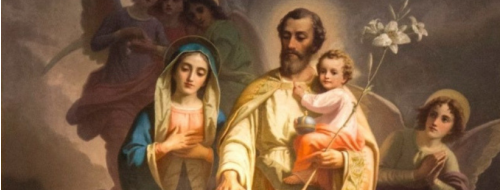 Family Matters
Family Matters
Losing a Baby And Finding Hope Part 4
Taken from the pages of the book “A Child At Any Cost” Edited and shortened for this article.
God's Loving Purposes
Perhaps I would understand why all this had happened to me-some of earth's sorrows will only be explained to us in heaven. But now I was beginning to realize and to believe that God had a purpose in everything that had happened to me. More than that, I began to believe that his was a loving purpose.
I was angry that despite feeling God was being cruel, I had no alternative but to turn to him for help. I also knew that I had been a Christian for so long that I could not abandon my Christian faith., it was too important to me. Yet, I resented the fact that I had nowhere else to turn other than to God. No choice was given to me.
Then I realized that the person who had no choice in this was not me but God! Since He had made me a child of His, come what may I knew he would go on loving me as a father continues to love his children no matter what happens to them. God might be disappointed or even angry with me at times but he promised to love me. His promises are clear in the Bible, so He was lumbered with me! this thought began to thrill me and became the key which unlocked my self-imposed prison isolating me from God.
I looked back over the years and realized ways in which God had cared for, protected guided, and loved me. I remembered many of the good things. He had given me-a wonderful husband, a home, health and strength, and friends who really cared for me. As I began to think like this, the question "why" became less important to me until I was able to reaffirm the words I had spoken to God in the car. "Yes Lord, I do love You more than anyone else- more than my baby. Even though I don't understand why, I still trust You.
Trusting In The Dark
I could also see that the persistent theme of trusting God, found in my daily Bible reading during pregnancy, applied to me for now as much as then. I must trust God even in the darkest night of sorrow. I saw too that the thoughts I had had in the car going to the antenatal clinic had been God's gentle preparation for what He knew lay ahead of me.
My pain and hurt did not disappear over4 night. Many dark days still faced me but I was proving that God's grace was (as the Bible says) "sufficient". I was learning to lean on God and learning to accept His plan for my life. Sometimes I felt that my heart was so broken that it would never mend. But with God all things are possible. He is able to mend even the most broken of hearts- as the psalmist says, "He healeth the broken in heart, and bindeth up their wounds" (Psalms 147:3).
During the pain and grief it is easy to think: "I'll never be happy again. My great grief will remain with me forever and ever, and I'll never get over it." In one sense you never recover from it but you do learn to cope, to accept and eventually healing will take place within you.

Lamp and Light Commentary

"Thy word is a lamp to my feet, and a light to my paths." (Psalms 119:105)
Genesis 13-14: Abraham, Lot And Melchizedek
We are continuing our study in the book of Genesis, and we have been working through the life of Abraham and ended last week with Abraham in chapter 12 being in Egypt.
Now I want to mention something more serious. Something happened in Egypt that produced consequences for the next 4000 years. When Abraham went to Egypt and saw the rich people there having maids (female servants) in their houses, he decided to have one himself too. So he picked up a servant woman named Hagar. When he came back from Egypt, he brought her with him. Sarah didn't have to do all the work in the tent now.
Hagar was there to help her. Later, when Sarah didn't have any children, Hagar was there to help her. With that problem, too ! Through Hagar came Ishmael whose descendants have been in conflict with the descendants of Isaac for 4000 years. But all this started with one man not listening to God once. You may say, “Well, most of the time I listen to God.” Good. But what we see here is the consequences of not listening to God just once. I hope that message will come home to us with seriousness.
When there is a famine, we must wait on God, and say, Lord, what do You want me to do?”
Maybe God will tell us to go somewhere. Maybe not. Years later, God did tell Jacob to go to Egypt during a time of famine. But that was not God's will at this time for Abraham. If God tells you to go somewhere, go. If God tells you to turn the stones into bread, do that. But wait for God to speak. That is the important thing.
Now I want to show you something good about Abraham. I am mentioning these things just to show you that Abraham was an ordinary man just like all of us. We shouldn't be discouraged by our failures. In Genesis 13:7 we read that there was strife between Abraham's servants and Lot's servants. Abraham and Lot obtained vast wealth through their trip to Egypt and now that wealth causes problems. Wealth always causes problems. Lot and his wife were affected by what they saw in Egypt. They wanted to make more money. But Abraham was a man who would not fight with anybody. But his servants fought.
Whereupon also there arose a strife between the herdsmen of Abram and of Lot. And at that time the Canaanite and the Perizzite dwelled in that country. (Genesis 13:7) Why is that last sentence included there? Because those heathen people were watching this fight. This is very relevant to the situation in the Catholic Church today as well.
The heathen are dwelling in the land and what do they see? Sects under the name of being Catholic fighting with each other.
And in the midst of all this can we find a godly man like Abraham today who will call Lot, (the worldly person who loves money), and say to him, “Let there be no quarrel, I beseech thee, between me and thee...for we are brethren” (13:8). They were not brothers in the literal since. Abraham was Lots Uncle, and Lot was Abrahams Nephew. See the graciousness of this 75 year old man to his 35 year old nephew? “For we are brethren!” A godly man is a humble man. Abraham was 75 years old, but he could look at this young nephew and say, “We are brothers. You are equal to me. I will give you preference. Choose what you want.” The Church is built by such men. The Church needs such leaders-and they are not easily found.
Today, we have many leaders who assert their authority, who would have said, “I am 75 years old, I am your uncle. I am the one who God called not you, you just came along with me,” But Abraham did not speak like that to Lot. He said to Lot, “if thou wilt go to the left hand, I will take the right: if thou choose the right hand, I will pass to the left. You take what you want first.” (13:9). And Lot, greedy man that he was, with the spirit of Babylon, grabbed first. He looked at the lovely fields of Sodom, saw the opportunity to make money there, and the rich people who lived there, and said, “I'll move there and serve God there as well.”
Many Priest from other poor countries migrate to wealthy countries and to serve in wealthy parishes and diocese because they love money and ease. But invariably, they lose out spiritually.
Do you go somewhere because God led you there or because the life of ease attracts you?
When Abraham was making this decision, the Lord had come down (as in Babel), to see what he and Lot were doing, and the Lord saw the godly way on which Abraham conducted himself. Immediately after Lot had left him, the Lord said something very important to Abraham. Understand that God separated him first from his father (by death), and then He separated Abraham from yet another relative (who would have been a hindrance to him through his covetousness).
And the Lord said to Abram, after Lot was separated from him: Lift up thy eyes, and look from the place wherein thou now art, to the north and to the south, to the east and to the west. All the land which thou seest, I will give to thee, and to thy seed for ever. And I will make thy seed as the dust of the earth: if any man be able to number the dust of the earth, he shall be able to number thy seed also. Arise and walk through the land in the length, and in the breadth thereof: for I will give it to thee. (13:14-17)
God was saying, “now you are alone and now I can get you to go where I want you to go and to be what I want you to be. I saw exactly what happened”. Do you know that God watches every transaction that takes place between people? He watches our attitudes.
Have you given up your right to something because you are a Christian?
God says to you, “I have taken note of that.”
Then God said to Abraham, “Just stand here and look north, south, east, west. All the land that you can see will one day belong to your children. I promise that. It will not belong to the descendants of Lot.” God said that to Abraham 4000 years ago. Look at the land today, 4000 years later and ask yourself who is living there. The descendants of Abraham, not the descendants of Lot. God keeps his word. Thousand of years may go by, but if God has said to Abraham, “All the land which thou seest, I will give to thee, and to thy seed for ever.” (13:15), then it will be exactly like that.
Then we see in Chapter 14 how Lot got into trouble.
You always get into trouble when you go outside the will of God.
He was captured by his enemies, Abraham could have said, “serves him right”. But Abraham did not react like that. There you see another time that Abraham was tested: What would Abraham's attitude be, when he hears that this man who cheated him, has got into trouble? When somebody who has cheated you gets into trouble himself, then you will discover very quickly whether you are a man of God or not. Abraham's reaction and attitude was, “Let me go and help Lot. It's true that Lot cheated me. But what did he cheat me of? Some garbage of earthly wealth. That's nothing. I've got heavenly riches. I feel sorry for Lot because he went after earthly things, and now he has got into trouble, Let me go and help him.” And Abraham went and delivered Lot himself. That's the attitude of a godly person.
On his way back from the battle, Abraham was exhausted, and possibly proud of the fact that with just 318 servants he went and destroyed the many armies of so many kings, He was also in danger of collecting all that wealth that he had accumulated through winning this battle. In those days if you won a battle all the gold and silver of the enemy's was yours. At that time God sent a servant of His to Abraham. Isn't it wonderful to see that? An unknown man named Melchizedek, who was living out there in the desert, was in touch with God. You read about him in (14:8).
The reason why Melchizedek is important is because in Psalms 110:4 Jesus is called a Priest after the order of Melchizedek. “Thou art a priest for ever according to the order of Melchizedek.” And in Hebrews 7 that is confirmed. The only place in Scriptures where Melchizedek comes is in 14:18-20...three verses...that's all. Melchizedek appears, fulfils his ministry and disappears. And God said to his Son, "Thou art a priest for ever according to the order of Melchizedek.” Not a priest after the order of Levi- the old covenant priesthood. How did this man Melchizedek, who appears in only three verses in the Bible, become so important? It is good for us to know the reason.
Although Melchizedek remains an elusive figure in the Scripture, He appears in the Roman Canon at Mass; today’s priests are ordained to “the Order of Melchizedek,” and his appearance in Genesis forms the basis of some of our theology of the priesthood.
His appearance in Genesis 14 is quite minimal and set at a point very early in Abram’s faith journey. Identified in the Scripture as “King of Salem,” ancient Jewish sources see him as the leader of the entire area, a wise sage of a man whom the rest must respect. But this does not answer the question of his identity. We must look back even further.
As Abram presents Melchizedek with a tithe, Melchizedek gives him a blessing in return. Here is the hint we’ve been looking for! The last person to receive a blessing was the oldest son of Noah: Shem. Adding up the dates of Shem’s life, we learn that he was actually still alive during Abram’s time, and in fact outlived Abraham!
Blessings at this time in history were not things that could be easily exchanged, once they were given, they could not be taken back.
As an example we have Jacob’s stealing of Issac’s paternal blessing from his older brother Esau. Blessings are tangible things, so Melchizedek/Shem must still have the one given to him by his father, Noah; and he now passes it on to his descendant Abram or Abraham, the one chosen by God to be the father of many nations.
All of these identities have priestly functions, but it is taken to an even greater degree when we see what Melchizedek offers as a priest, for priests offer sacrifices and Melchizedek offers a sacrifice of bread and wine. This sets off signal flares in the eyes of a Catholic, for our priests also offer sacrifices of bread and wine, now fulfilled in Christ to be His very Body and Blood.
What becomes important for today is that the priesthood in which Catholic Priests share, and by extension that all the baptized share in as well, goes back not just to the Sacrifice in the Jerusalem Temple, but back to the very foundations of creation by God. Melchizedek is identified as “a priest forever” in Psalm 110, his priesthood continues on into the ages.
The Catholic Priest, in the place of Christ the Head, also shares in this eternal priesthood, continually offering a sacrifice of bread and wine before God in Heaven.
Uniting all of this into one, we see God’s divine plan in the scope of Salvation History. That Jesus came when He did is not some type of accidental occurrence, but had been planned out from before by our Loving Father. God wants to give us the tools to return to His presence in Heaven. Let us therefore rejoice that Christ left us with the great gift of the priesthood, that He continues to choose men to serve Him in this way, so that we might all come to worship Him forever around His altar in heaven.


Books to feed your faith!
Baltimore Catechism Number 4
$11.95
This is also known as An Explanation of the Baltimore Catechism of Christian Doctrine for the Use of Sunday-School Teachers and Advanced Classes. These have been restored to their original format. Another publisher has changed the fast regulations to those put in place after Vatican II. We have added the fast regulations in place at the time of Pope Pius XII's death. The Catechism forms a part of the ordinary magisterium (teaching authority of the Church).
The Sources of Catholic Dogma
$24.95
The Sources of Catholic Dogma is a translation of the Enchiridion Symbolorum. It contains dogmatic pronouncements and decisions of the Councils of the Church and the Roman Pontiffs. This is a valuable tool for anyone who wants to know what the Catholic Church truly teaches. This edition has been corrected, as some slight errors made it into the original English translation. These are noted on the pages and the correction page is appended at the end.
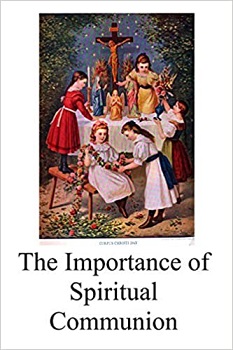
The Importance of Spiritual Communion
Kindle $2.99 / Paperback $5.99
If we cannot receive Holy Communion actually, then let us do so spiritually. These prayers and instructions have been gathered from the Saints and other venerated spiritual writers. Spiritual Communion has been a part of the spiritual life for decades. Growing up I was instructed to make a Spiritual Communion, when I could not go to Communion such as when I assisted at a second Mass. The same is true if one finds oneself at Mass, but not fasting. There are times coming, when it will be difficult, if not impossible to assist at the Holy Sacrifice of the Mass. We should be prepared for such times.

German Cucumber Salad

Prep: 20 minutes
Ready In: 8 hours
"A traditional German favorite that I have loved since I was a child. This recipe is quick, easy, and delicious. Substitute cider vinegar for a different flavor. I prefer to leave the skins on the cucumbers for more texture and flavor, but they can also be peeled prior to slicing if desired. Flavor is best when marinated for several hours before serving."
Ingredients
2 large cucumbers, sliced thin
1/2 onion, sliced thin (optional)
1 teaspoon salt
1/2 cup sour cream
2 tablespoons white sugar
2 tablespoons white vinegar
1 teaspoon dried dill
1 teaspoon dried parsley
1 teaspoon paprika
Directions
Spread cucumbers and onion on a platter; season with salt and let rest for 30 minutes. Squeeze excess moisture.
Stir sour cream, sugar, vinegar, dill, and parsley together in a large bowl.
Fold cucumber and onion slices into the sour cream mixture.
Refrigerate 8 hours to over night; garnish with paprika to serve.
Blueberry Zucchini Bread

Prep: 15 minutes
Cook: 50 minutes
Ready In: 1 hour 45 minutes
"Blueberries and zucchini baked up into delicious little summertime bread loaves!"
Ingredients
3 eggs, lightly beaten
1 cup vegetable oil
3 teaspoons vanilla extract
2 1/4 cups white sugar
2 cups shredded zucchini
3 cups all-purpose flour
1 teaspoon salt
1 teaspoon baking powder
1/4 teaspoon baking soda
1 tablespoon ground cinnamon
1 pint fresh blueberries
Directions
Preheat oven to 350 degrees F (175 degrees C). Lightly grease 4 mini-loaf pans.
In a large bowl, beat together the eggs, oil, vanilla, and sugar. Fold in the zucchini. Beat in the flour, salt, baking powder, baking soda, and cinnamon. Gently fold in the blueberries. Transfer to the prepared mini-loaf pans.
Bake 50 minutes in the preheated oven, or until a knife inserted in the center of a loaf comes out clean. Cool 20 minutes in pans, then turn out onto wire racks to cool completely.
Video sermons and instructions: Timeless timely truths for living the Faith
Fourth Sunday after Pentecost 2011
Precious Blood of Jesus 2012
A Forgotten Part of Charity 2013
Lamp and Light: Swine Storms and Mother in Laws
Vatican In Exile Podcasts
Family Theater
Family Theater was a program created to promote family unity and each week saw a drama illustrating the importance of family life and prayer. The main reason for the success of this series was undoubtedly due to the numerous Hollywood stars that participated.
Cast: Bing Crosby, Gary Cooper, James Stewart, Gregory Peck, Shirley Temple Director: Fred MacKaye, Dave Young, Joseph Mansfield, Richard Sanville, Jaime del Valle, Mel Williamson, Robert O’Sullivan, John Kelley Producer: Father Patrick Peyton, Bob Longenecker Host: Father Patrick Peyton Writer: True Boardman , Father Patrick Peyton Announcer:Tony LaFrano
Ranger Bill
Ranger Bill was a Christian radio adventure serial, and aimed at the younger generation. This turned out to be one of the most successful radio broadcasts, and with an amazing longevity of over twelve years. The very first fifteen minute episode was aired on October 2, 1950, but this later changed to a half hour episode, beginning May 14, 1954 and running right through until 1962.
Catechism Corner
Catechizing with a fresh perspective. Using the Holy Scriptures and the Catechism of the Council of Trent as foundational bases.
Lamp and Light Bible Study
Lamp and Light Bible Study is not a ‘theological’ study but a ‘life application’ study.
Our in house Priest will show that every single book of the Bible is interesting and has a message for us today. It deals with key aspects of the Christian life and speaks more to the heart than to the head.
Sunday Sermon
The Ave Maria Hour
The Ave Maria Hour first aired on April 26, 1935, on radio station WOR. It was presented by the Franciscan Friars of the Atonement to help the humanitarian work of St. Christopher’s Inn, and during that first show, Servant of God Father Paul of Graymoor talked about the charity involved in caring for the men of the Inn. In 1937, it was estimated that nearly 1 million listeners were tuning in each week, which resulted in large pilgrimages coming to Graymoor.
The popular Ave Maria Hour continued until 1969, encouraging and entertaining listeners. It was heard on more than 350 stations as well as on the Armed Forces Radio Service. Recorded in a studio in New York City and on the grounds of Graymoor, these dramatizations of the lives of the saints, stories from the Gospel, and inspiring accounts of faith received many awards for religious radio programs sponsored by the American Exhibition of Educational Radio and Television programs of Ohio State University. It received the Golden Bell Award in 1959, presented by Ed Sullivan on live television.
The Bible In Living Sound
THE BIBLE IN LIVING SOUND, the original dramatized audio Bible stories . . . really gets kids excited about the Bible! These 450 spiritually enthralling stories, re-enacted with music and lively sound effects, leave impressions of lasting beauty and wonder, putting the listener in the Red Sea at the crossing, beside David as he confronts Goliath, with Mary and Joseph in the stable, and there at the foot of the Cross. These stunning dramatizations captivate listeners of all ages as they are enriched by visualizing the values taught in God's Word. Listeners want to hear these audio Bible stories again and again.

Day Two
Getting Earth Ready For Life
As part of what happened on day two, God was obviously preparing the atmosphere for living things. On days three, five, and six of creation week, we will find that God made all sorts of living things-plants, flying creatures, sea creatures, and land animals. We know that all living creatures need air so they can live. Most living things need oxygen. Every time you breath in, your body takes the gas oxygen out of the air so your body can function.
We obtain our food from animals (in a post-Fall world) and/or plants. Even the animals we eat get their food from plants, or they eat animals that in turn eat plants. So, really, our food ultimately comes from plants. Plants use the gas oxygen, but they also use another gas called carbon dioxide. Both of theses are par of the air we breathe. Plants also use water. They use a combination of carbon dioxide, water, and sunlight to make food so animals and people can eat them to get their food.
On day three of creation, God made all the plants. So when He was p[preparing this atmosphere on day two, He must have put oxygen and carbon dioxide around the earth so the plants and later the animals would be able to live.
We know oxygen had to be in the air when the earth was just over one day old. This means there was oxygen around the earth from almost the beginning.
Creation vs. Evolution The Order of Events Doesn't Agree
People who believe in evolution do not believe the air around the earth had oxygen in it when the earth first existed. They believe that the air was very poisonous, made up of gases there would be no life on this planet.
Now why do evolutionists believe the first atmosphere had these poisonous gasses? Well, because the substances (chemicals) that make up living things could not evolve if there was oxygen in the air. They would, in a sense, just "burn up" and life from non-life would be impossible. You see, evolutionists believe that chemicals just came together by chance to make all the very complex substances (including DNA, which is really an information system and language system) that are a part of living systems. But they also know that this could not happen if there was oxygen. And yet, for most living things, they need oxygen to live!
Now scientists have discovered oxygen in rocks they believe were supposedly part of the earth when the earth first existed. So, from their own evolutionary story, evolutionists have to accept that there must have been oxygen in the air from the beginning of the world-which is contradictory to their evolutionary worldview.

Catechism Catch-Up
Forgive One Another in Marriage

God has designed marriage to be the closest of all human relationships. A man is to leave his father and mother, the siblings of his childhood, and cleave to his wife.
In arranged marriages, couples may enter with very low expectations.They did not want to marry, or perhaps only one did, so there is so very little expected from the relationship. Watching the light go out in the eyes of a youth reveals a little of the deep heartache and despair they endure.
On contrast, marriages for love bring high expectations. A mutual attraction has developed. Finally the wedding day arrives. If a marriage for love goes sour and the light of love is replaced by the dull look of pain there is even deeper heartache.
A wedding day does not cure human nature. Often times the first offenses begin innocently. What is normal in one family is very different from what is normal in another family. After a while and after enough hurts, it is easy for couples to slip into a frustrated mode of reacting from a hurt with a hurt. When sharp words are said, sharp words are returned. Rebukes meet retorts. Anger may turn into wrath. Sometimes men learn their superior strength can be used to force their will on a weaker woman. The woman may learn how to push her man over the edge through a nagging tongue.
Is there any hope for a marriage that has jagged tears through its fabric? Some failures go deep causing lifetime consequences. Forgiveness means one chooses to be okay with broken dreams, the consequences of another’s sin and all the reaping they are forced to endure. This is impossible for human nature on its own.
God’s answer is for one to draw near to His loving presence and put on humbleness of mind. When just one spouse can draw from the wellspring of the love of God, there is hope that God can put the relationship back on track. The answer always begins with forgiveness; sending the pain away each time it returns, acknowledging it but refusing to re-feel it again. This lesson helps us explore the how of forgiveness.
Hurts and offenses are a normal part of earth life. Forgiveness is a divine gift for all those who know and experience Christ.
In the storybook ending the couple supposedly lives happily ever after. Some marriage partners come to engagement or marriage with those unrealistic expectations. They are sure they will never take each other for granted, or especially will never want to hurt the one they love so deeply.
When hurts come, newlyweds often are heartbroken. Often a marriage counselor who is hoping to help a couple find help for their marriage will discover a deep hurt or grudge that one of the spouses received in their early married life. This hurt was nursed and allowed to fester through the years.
We need to condition ourselves and our children about life. Disagreements are normal. People will express disregard for our feelings and not even realize they are hurting us.
Jesus came with a wonderful ingredient in the Gospel. We receive forgiveness for our sins. Likewise we have the power to forgive. Any sin. Any size. No matter how often it has been repeated. Period.
Simply let the matter go. In fact, the word for forgive is sometimes translated “divorce” or “send it away.” That means you plan no future with that hurt. We have that ability and we have that command.
Forgiving seventy times seven means we forgive without keeping score.
According to Rabbinic tradition, a man should forgive his brother three times. This was the number of times God had shared through Amos that He had forgiven Israel before punishing them. Peter no doubt reasoned that seven would be going the second mile. Seventy times seven is not even about numbers. Jesus’ teaching is that when we are hurt we don’t start to keep score.
Pain accumulates. Any person who needs to reach into a box of screws can tell you that. The first time you grab a handful, there is some pain. By the time quitting time comes and you’ve grabbed a million handfuls of screws, it is excruciating! When we keep a painful memory, it will add to the next incident. Eventually we can pass our threshold of tolerance.
The right thing is to take the pain to the cross every time we think of it. When we look up at Christ’s great suffering for us, and then down at the pain we may be stubbornly hanging on to, we see how we must let our hurts go. Then when the next hurt comes there is no pile to add it to.
Forgiveness means we don’t keep going over the offense, i.e. we do not bring the incident up in our minds but let it fade away.
Some people wonder if we remember an offense and still feel some of the pain if we really have forgiven. That is a vital question. We cannot experience forgivingness and resentment at the same time. The word resent comes from a Latin root “re+sentire.” That means choosing to feel the pain associated with the memory over again.
When we are hurt we feel pain. Many times emotional pain can hurt even deeper than physical pain. Forgiveness means letting the pain go, sending it away, refusing to feel it. Resentment means a person revives the feeling with the memory of the pain. When an incident is brought back from years ago, he becomes emotionally involved in how he felt in that painful experience. Forgiveness means we stop choosing to feel the pain each time we remember the event. We simply tell our feelings we won’t go there.
Human nature causes us to be blind to our own faults while exaggerating in our minds the faults of others.
One of the reasons we need to stress forgiveness in marriage is because our self judgment can be so twisted. As humans, we see another’s faults in vivid detail. But we can hardly see our own. This is true for marriage too. When a couple has entered the most intense phase of trying to make each other change, they may see and say things the spouse is totally blind to. The harder each tries to help the other see himself, the less likely either one will find their way through.
Fellow servants who are not emotionally involved in our situation can often identify our inconsistencies and will help us if we will but hearken to their rebukes.
The Proverb writer lets us in on a secret. (Proverbs 9:7-9) The way to discern between a wise man and a foolish man is to see how he receives correction.
Husband or wife, if we allow ourselves to become hurt when someone endeavors to correct us, we are foolish. If we can believe that others see us better than we see ourselves, if we can believe their corrections are for our benefit, if we can allow others to overstate themselves and not become offended by it, then we can grow.
The closer one walks with Christ, the better marriage partner he will be.
A careful study of the Gospels provides a simple but profound truth. Jesus has the answer for every type of problem every single time. We become accustomed to specialists, doctors who will consider only one type of problem. They may be able to help with a broken bone, but have no expertise for chronic heart problems. Our Lord Jesus promised to be the Living Water that springs up within and always satisfies. He is also the Bread of Life. He is the Light of the world. And so forth...
So what does this mean to the hurting marriage partner? It means there will always be a Lord to listen to your needs, to lead you in your decisions and to give you resources for life’s demands. Those who reach out to Christ will never be let down.
This closeness to Christ is accomplished through Bible reading and prayer. It is also met in continuing to fellowship with a Biblical church fellowship. When people are hurting, they may be tempted to pull off to the side and not want to face people. This is true especially when we have the feeling that church life is about spiritual elitism or competition to prove one is better than another. Find a spiritual church, one that truly represents Christ’s body on earth. A church that professes godliness but denies Christ’s power will not have the answer. Neither will one that ignores discipleship.
God knows we need chastisements in life and will allow us to experience hurts in order to help us grow in righteousness.
The key to making it through dark days is to always exercise faith. We must see that God is more interested in our refinement and eternal destiny than in our immediate comfort. He often uses the valley of pain to lead us to the lofty heights of fellowship.
The Hebrew writer compares an illegitimate child to one who does not receive chastisement from God. All receive chastisement. To some it is just fate, or bad luck. That child does not have a Father. Others see the good hand of God in their suffering. They look up and draw strength. They look around and see someone in greater need than themselves. They see the hand of God.
When we resent the person or the hurt of chastisement, we fail to see God’s hand in the matter and open ourselves to bitterness and its consequences.
Esau is an example of one who was misused by his family. He becomes a warning to someone who lives among those who profess to be godly, yet has expressions of selfishness. Esau chose to become bitter. That bitterness became an opening for Satan to tempt him with immorality. He also succumbed to a life void of spiritual interest (profane). Many times overwhelming temptations in either of these areas indicate an unforgiving spirit over some hurt from bygone days.
God has an unlimited supply of grace for His children, but God only gives this gift to the humble. The proud will not consider forgiving those who hurt them. They want revenge. God will resist the proud. Letting the hurt go is the choice of the humble. Choosing to love the offender is the path to God’s blessing in our lives.
What Is Iniquity?

Iniquity is the inner act of willfulness against God. It involves the attitudes of the heart. Scripture specifically identifies the following iniquities: bitterness (see Acts 8:23), greed (see Acts 8:18–23), lust (Job 31:1–12), and stubbornness (I Samuel 15:23).
The Greek word for iniquity that is used most frequently in the New Testament is anŏmia, which means “illegality, i.e. violation of the law or . . . wickedness.” It stems from the word anŏmŏs, which refers to not being subject to the law. Based on the teaching of Jesus and other passages of Scripture, iniquity is doing our own will instead of God’s will, even if our own will appears to be “doing good.”
Jesus said: “Not every one that saith to me, Lord, Lord, shall enter into the kingdom of heaven: but he that doth the will of my Father who is in heaven, he shall enter into the kingdom of heaven. Many will say to me in that day: Lord, Lord, have not we prophesied in thy name, and cast out devils in thy name, and done many miracles in thy name? And then will I profess unto them, I never knew you: depart from me, you that work iniquity.” (Matthew 7:21–23).
The definition of iniquity as “doing our own will” is confirmed in Isaiah 53:6: “All we like sheep have gone astray, every one hath turned aside into his own way: and the Lord hath laid on him the iniquity of us all.”
Psalm 119:1–3 declares that when we walk in God’s ways, we do no iniquity: “Blessed are the undefiled in the way, who walk in the law of the Lord. Blessed are they who search his testimonies: that seek him with their whole heart. For they that work iniquity, have not walked in his ways.”
To Learn More Principles For Life Go To: Resources: Principles of Life

Enjoying the Olive Tree? Why not subscribe today? Click here to go to the FREE scubscription page!


- Please continue to pray for the repose of the soul of the Holy Father, Pope Michael.
- Your prayers and support are asked for the House of Prayer in Topeka Kansas.
- Your prayers and support are asked for in a practical way for our domestic missionary work: for traveling expenses to offer mass in other states as Society of Saints Paul And Silas (SSPS) missionary priest travel. Can you help?
- Needing to raise 3000.00 for Mission Trip to the Philippines in January.
- Please pray for the health of Deacon Stephen and his dear wife.
- Be sure to keep St. Helen Catholic Mission in your prayers. Why not go on over to the site now and see what they have to offer and how you might be able to help!
- We are all praying especially for you, too. May you correspond with every grace of God!
- In what other needs or intentions may we pray for you? Let us know at vaticaninexile@gmail.com
- Let us remember that the Church runs on prayer. Without your prayers, God will not work in hearts and souls to bring them to a knowledge of the truth. (I Timothy 2:4)


To Donate online go to:
Donations

To Donate by Mail:
Our address is
Vatican in Exile
423 NE Grattan ST
Topeka, Kansas 66616
Make Checks payable to:
Vatican in Exile

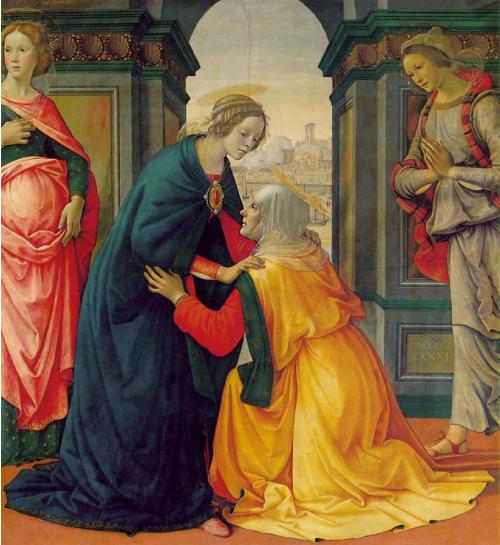






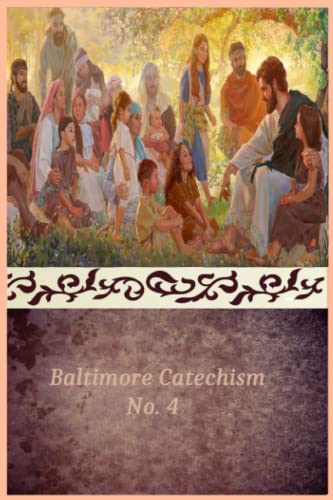








 Follow
Follow


